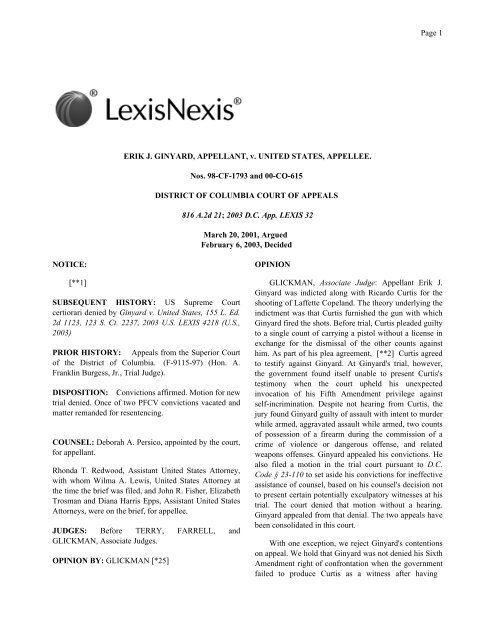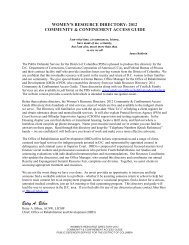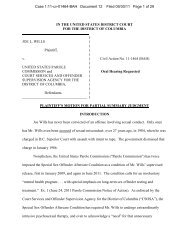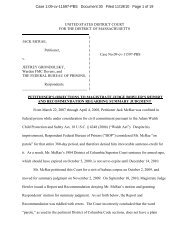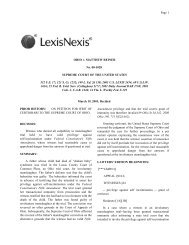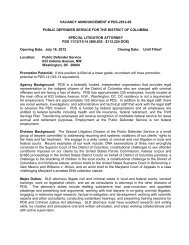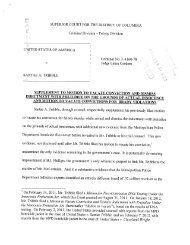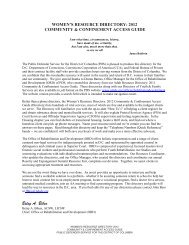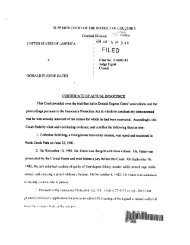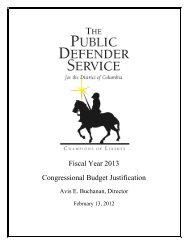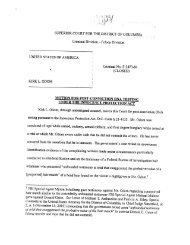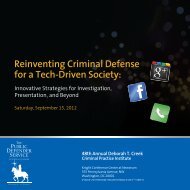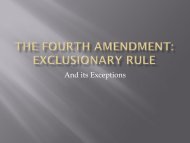ERIK J. GINYARD, APPELLANT, v. UNITED STATES, APPELLEE ...
ERIK J. GINYARD, APPELLANT, v. UNITED STATES, APPELLEE ...
ERIK J. GINYARD, APPELLANT, v. UNITED STATES, APPELLEE ...
Create successful ePaper yourself
Turn your PDF publications into a flip-book with our unique Google optimized e-Paper software.
Page 1<strong>ERIK</strong> J. <strong>GINYARD</strong>, <strong>APPELLANT</strong>, v. <strong>UNITED</strong> <strong>STATES</strong>, <strong>APPELLEE</strong>.Nos. 98-CF-1793 and 00-CO-615DISTRICT OF COLUMBIA COURT OF APPEALS816 A.2d 21; 2003 D.C. App. LEXIS 32March 20, 2001, ArguedFebruary 6, 2003, DecidedNOTICE:[**1]SUBSEQUENT HISTORY: US Supreme Courtcertiorari denied by Ginyard v. United States, 155 L. Ed.2d 1123, 123 S. Ct. 2237, 2003 U.S. LEXIS 4218 (U.S.,2003)PRIOR HISTORY: Appeals from the Superior Courtof the District of Columbia. (F-9115-97) (Hon. A.Franklin Burgess, Jr., Trial Judge).DISPOSITION: Convictions affirmed. Motion for newtrial denied. Once of two PFCV convictions vacated andmatter remanded for resentencing.COUNSEL: Deborah A. Persico, appointed by the court,for appellant.Rhonda T. Redwood, Assistant United States Attorney,with whom Wilma A. Lewis, United States Attorney atthe time the brief was filed, and John R. Fisher, ElizabethTrosman and Diana Harris Epps, Assistant United StatesAttorneys, were on the brief, for appellee.JUDGES: Before TERRY, FARRELL, andGLICKMAN, Associate Judges.OPINION BY: GLICKMAN [*25]OPINIONGLICKMAN, Associate Judge: Appellant Erik J.Ginyard was indicted along with Ricardo Curtis for theshooting of Laffette Copeland. The theory underlying theindictment was that Curtis furnished the gun with whichGinyard fired the shots. Before trial, Curtis pleaded guiltyto a single count of carrying a pistol without a license inexchange for the dismissal of the other counts againsthim. As part of his plea agreement, [**2] Curtis agreedto testify against Ginyard. At Ginyard's trial, however,the government found itself unable to present Curtis'stestimony when the court upheld his unexpectedinvocation of his Fifth Amendment privilege againstself-incrimination. Despite not hearing from Curtis, thejury found Ginyard guilty of assault with intent to murderwhile armed, aggravated assault while armed, two countsof possession of a firearm during the commission of acrime of violence or dangerous offense, and relatedweapons offenses. Ginyard appealed his convictions. Healso filed a motion in the trial court pursuant to D.C.Code § 23-110 to set aside his convictions for ineffectiveassistance of counsel, based on his counsel's decision notto present certain potentially exculpatory witnesses at histrial. The court denied that motion without a hearing.Ginyard appealed from that denial. The two appeals havebeen consolidated in this court.With one exception, we reject Ginyard's contentionson appeal. We hold that Ginyard was not denied his SixthAmendment right of confrontation when the governmentfailed to produce Curtis as a witness after having
816 A.2d 21, *26; 2003 D.C. App. LEXIS 32, **6Page 3against self-incrimination; [*27] the government'sfailure to disclose Curtis's testimony to Ginyard beforetrial; and the government's decision [**7] not toimmunize Curtis and call him as its witness.In her opening statement, counsel for the governmentsummarized the testimony she expected to present fromRicardo Curtis. She said only that Curtis had tried to giveGinyard a gun at various times during the day of theshooting and that Curtis had been thwarted one of thosetimes by the presence of Ginyard's mother. Nonetheless,the prosecutor obliquely concluded, "the person who waswanting this weapon that was used in the shooting wasMr. Ginyard" - implying that Curtis ultimately succeededin getting the weapon into Ginyard's hands.Ginyard's opening statement previewed evidenceexpected to show that Curtis was the shooter. In hissummary of this evidence, Ginyard's counsel profferedthat after Curtis was indicted, he wrote a letter asking afriend to "take care" of Copeland before Copeland couldtestify against him. The fortuitous discovery of thisincriminating letter during the execution of an unrelatedsearch warrant led the police to open an investigation ofCurtis for obstruction of justice. A police handwritingexaminer concluded that Curtis wrote the letter despiteCurtis's attempt to fool the examiner by altering his [**8]writing style in the handwriting samples he submitted.Informed of the examiner's conclusion, Curtis agreed toplead guilty to carrying a pistol without a license inexchange for the dismissal of "every other single chargethat was pending against him." His deal with thegovernment required Curtis to testify against Ginyard,"and that's why," defense counsel concluded, "we'll seehim in court sometime next week."This prediction did not come to pass. On the thirdday of trial, Curtis's attorney appeared in court andadvised that his client would assert his Fifth Amendmentprivilege against self- incrimination in response to anyquestions he might be asked about the letter he allegedlyhad written. The attorney explained that the governmenthad not agreed to drop the potential charge of obstructionof justice that was based on the letter, and that Curtis hadnot waived his privilege with respect to that charge whenhe pled guilty to carrying a pistol without a license. Thegovernment agreed that the obstruction charge was notcovered by the plea agreement and that Curtis retained aFifth Amendment privilege not to answer questions aboutthe incriminating letter.Although counsel for [**9] the government statedthat she did not intend to ask Curtis about the letter, thetrial court agreed with Ginyard's counsel that thedocument would be a proper subject of cross-examinationto impeach Curtis's credibility. Concluding that thegovernment could not benefit from Curtis's testimony ondirect if he could not be examined about the letter oncross, the court ruled that the government could not callCurtis as a witness unless it first immunized him fromprosecution for obstruction of justice in connection withthe letter. The government acquiesced in the court'sruling and elected to forego Curtis's testimony.Ginyard then moved for a mistrial, claiming that hewas prejudiced by the government's summarization ofCurtis's testimony in its opening statement. Ginyardargued that the government should have known thatCurtis would assert his Fifth Amendment privilege andnot testify. The court deemed a mistrial unwarranted. Itfound that the government had not proceeded in bad faithand concluded that it could negate any adverse inferencesfrom the failure of either party to call Curtis byinstructing the jury that he was unavailable to testify.Ginyard asked the court to [*28] tell [**10] the jurythat Curtis was unavailable because he had asserted hisprivilege against self-incrimination, which thegovernment opposed and the court refused to do.The following day, Ginyard renewed his objectionsto the government's opening statement. In the colloquythat ensued, the government proffered that if Curtis hadtestified, he would have said only that he attempted togive his gun to Ginyard on the day of the shooting buteventually gave it instead to Ginyard's friend Vernon.Although Curtis believed that Vernon passed the gun onto Ginyard, he did not see Vernon do so. Curtis claimedthat he did not see Ginyard shoot Copeland either and socould not say what gun he used. Vernon himself was nota government witness, and the government conceded thatit had no witness who could confirm that Curtis suppliedGinyard with a gun.In light of this proffer, the court deemed it a closequestion whether the government had a sufficient basis tosay in its opening statement that Ginyard used Curtis'sgun to shoot Copeland. Assuming arguendo that thegovernment's opening statement was improper for lack ofa sufficient foundation, the court nonetheless declined todeclare a mistrial. [**11] Rather, the court decided that itwould instruct the jury specifically to disregard anything
816 A.2d 21, *28; 2003 D.C. App. LEXIS 32, **11Page 4said in the opening statements about what Curtis'stestimony would have been.In addition to renewing his claim that thegovernment's opening statement was improper, Ginyardadvanced two other contentions. First, Ginyard claimedthat the government had committed a Brady 1 violationby not informing him before trial that Curtis said he gavehis gun to Vernon. Ginyard argued that if he had beentold that before trial, he might have called Vernon as awitness to contradict Curtis and testify that he did notreceive a gun from him. Ginyard's counselacknowledged, however, that he had not talked withVernon and did not know what Vernon would say. Thecourt refused to halt the proceedings but said it wouldconsider granting a motion for a new trial if Ginyardcould proffer that Vernon did have helpful testimony togive. (Ginyard did not include such a proffer in the newtrial motion that he subsequently made.)1 Brady v. Maryland, 373 U.S. 83, 10 L. Ed. 2d215, 83 S. Ct. 1194 (1963).[**12] Second, Ginyard objected to the trial court'sdetermination that Curtis had a valid Fifth Amendmentprivilege. Stating that the government had told him somemonths earlier that Curtis had admitted writing theincriminating letter, which the government did not deny,Ginyard's counsel argued that Curtis had waived his FifthAmendment privilege with respect to the letter.Unpersuaded by this contention, the court pointed outthat Ginyard had no right to require the government tocall Curtis as its witness or to resist Curtis's assertion ofhis Fifth Amendment privilege.The government did not mention Curtis in its closingarguments. Ginyard's counsel commented that Curtis"had become unavailable now . . . [and] didn't come in torespond" to the testimony that he was the shooter, eventhough the government had "promised" the jury it wouldhear from Curtis. The court instructed the jury not toconsider what counsel had said in their openingstatements about Curtis's anticipated testimony becausethe opening statements were not evidence and Curtis was"unavailable to be called as a witness by either side inthis case."B.Ginyard contends that he was denied his SixthAmendment [**13] right to confront the [*29]witnesses against him because he was unable tocross-examine Curtis after the government previewed histestimony in its opening statement. Ginyard furthercontends that the government proceeded in bad faithwhen it implied that Curtis would say he gave his gun toGinyard, because it knew or had reason to know both thatCurtis would invoke his Fifth Amendment privilege andnot testify and that if Curtis did testify he would say onlythat he gave his gun to Vernon. Ginyard argues that thegovernment's misleading forecast of Curtis's testimonylent critical support to Copeland's otherwiseuncorroborated identification of Ginyard as his assailant.Emphasizing that his trial lasted only a few days, Ginyardfurther argues that the government's summary of Curtis'stestimony was still fresh in the jurors' minds when theyretired to deliberate, and that the court's instruction to thejury not to consider it could not nullify its prejudicialimpact.Forcefully as Ginyard presses these arguments, hedoes not persuade us that the trial court abused itsdiscretion in denying his motion for a mistrial. Rather,guided by binding precedent, we hold that the trial court'slimiting [**14] instruction to the jury properly andadequately protected Ginyard's rights.The Supreme Court confronted a situation much likethe one before us now in Frazier v. Cupp, 394 U.S. 731,22 L. Ed. 2d 684, 89 S. Ct. 1420 (1969). After theprosecutor in that case had described in his openingstatement the testimony he expected to present from aco-defendant who had pled guilty, the co-defendantasserted his privilege against self-incrimination andrefused to answer any questions. The trial court instructedthe jury not to consider the prosecutor's openingstatement as evidence. The Supreme Court held that thisinstruction sufficed to protect the defendant's SixthAmendment rights:It may be that some remarks included in an openingor closing statement could be so prejudicial that a findingof error, or even constitutional error, would beunavoidable. But here we have no more than an objectivesummary of evidence which the prosecutor reasonablyexpected to produce. Many things might happen duringthe course of the trial which would prevent thepresentation of all the evidence described in advance.Certainly not every variance between the advancedescription and the actual [**15] presentation constitutesreversible error, when a proper limiting instruction has
816 A.2d 21, *29; 2003 D.C. App. LEXIS 32, **15Page 5been given. Even if it is unreasonable to assume that ajury can disregard a coconspirator's statement whenintroduced against one of two joint defendants, it does notseem at all remarkable to assume that the jury willordinarily be able to limit its consideration to theevidence introduced during the trial. At least where theanticipated, and unproduced, evidence is not touted to thejury as a crucial part of the prosecution's case, "it is hardfor us to imagine that the minds of the jurors would be soinfluenced by such incidental statements during this longtrial that they would not appraise the evidence objectivelyand dispassionately."Frazier, 394 U.S. at 736 (quoting United States v.Socony-Vacuum Oil Co., 310 U.S. 150, 239, 84 L. Ed.1129, 60 S. Ct. 811 (1940)). The Court added that "theprosecutor's good faith, or lack of it," in expecting thatthe co- defendant would testify, was not "controlling" indetermining whether the defendant was deprived of hisconstitutional rights. Id.Comparable situations presented themselves to thiscourt in Burkley v. United States, 373 A.2d 878 (D.C.1977), [**16] and [*30] Walker v. United States, 630A.2d 658 (D.C. 1993). In Burkley, after the prosecutorsaid in his opening that a convicted accomplice wouldimplicate the defendant, the accomplice refused to testify.Following Frazier, we held that the trial court adequatelyprotected the defendant's confrontation rights byinstructing the jury not to consider the prosecutor'sopening remarks. "We presume," we said,unless the contrary appears, that the jury understood andfollowed the court's instructions. . . . Here, there wasnothing to suggest that the jury did not comprehend andrespect the admonitions of the trial court.373 A.2d at 881 (citation omitted). Similarly, in Walker,the government said in its opening statement that acertain witness would testify that the defendant hadadmitted that he committed the offense for which he wason trial. When the witness, who was under subpoena, didnot appear for trial, the defendant moved for a mistrial onthe ground that the government failed to substantiate therepresentation it had made in its opening. We held thatthe trial court did not abuse its discretion in denying amistrial, as there was [**17] no bad faith on the part ofthe government, the government's case otherwise wasstrong, and any possible prejudice was cured by thecourt's instruction to the jury that the opening statementswere not evidence. As a general rule, we observed, "'thelaw does not require that the opening trial statements becompletely supported by evidence introduced during thetrial. . . . [and] the failure to sustain all opening remarksduring the trial is not automatically ground for a newtrial.'" 630 A.2d at 667 (quoting Robinson v. UnitedStates, 361 A.2d 199, 200 (D.C. 1976)).The facts of the present case do not call for adeparture from Frazier, Burkley and Walker. In itsopening statement, the government referred to Curtis'santicipated testimony only briefly, and rather opaquely atthat. In its closing arguments the government did notrefer to Curtis at all. Unquestionably, Curtis's testimonywas "not touted to the jury as a crucial part of theprosecution's case." Frazier, 394 U.S. at 736. Nor did thegovernment improperly ask the jury to draw adverseinferences from Curtis's assertion of his FifthAmendment privilege (which the [**18] jury did noteven know about). Cf. Namet v. United States, 373 U.S.179, 186-87, 10 L. Ed. 2d 278, 83 S. Ct. 1151 (1963). Thetrial court gave a proper limiting instruction to the jury - amore specific instruction, indeed, than that given the juryin Frazier - and as in Burkley we see no reason to thinkthat the instruction was inadequate or that the jurydisregarded it. We think it fanciful for Ginyard tosuggest, as he does in his brief, that the instructionimplied that he knew in advance of trial that Curtis wouldnot testify and that he was at fault for commenting aboutCurtis's expected testimony in his opening. We perceiveno such implications. The court wisely refused Ginyard'srequest to instruct the jury that Curtis had asserted hisprivilege against self-incrimination. That instruction onlywould have encouraged the jury to draw unwarrantedinferences, such as that Curtis had owned up to shootingCopeland himself.We are unpersuaded by Ginyard's claim ofprosecutorial misconduct. To be sure, "it isunprofessional conduct for counsel to 'allude [in hisopening statement] to any evidence unless there is a goodfaith and reasonable basis for believing [**19] [that]such evidence will be tendered and admitted.'" Frederickv. United States, 741 A.2d 427, 440-41 n.25 (D.C. 1999)(quoting ABA STANDARDS FOR CRIMINALJUSTICE 7.4 (The Defense Function) (1993)). It mighthave been [*31] foreseeable that Curtis would assert aFifth Amendment privilege at Ginyard's trial, given thatthe government had not agreed to forego prosecuting himfor obstruction of justice in connection with the
816 A.2d 21, *31; 2003 D.C. App. LEXIS 32, **19Page 6incriminating letter he allegedly wrote. But suchforeseeability is not the measure of bad faith. Curtis hadpromised to testify against Ginyard as part of his pleaagreement. When he made that promise, Curtis wasrepresented by counsel, and both he and his counsel knewthat he remained subject to a potential obstruction charge.The facts underlying that charge were not the subject ofGinyard's trial or the government's intended examinationof Curtis. It was not until three days into that trial thatCurtis's counsel informed the government that he wouldassert a privilege if he was questioned about the letter.The trial court found that the government had areasonable belief up until that time that Curtis wouldtestify. The record supports that finding. [**20] 22 At one point in his brief, Ginyard accuses thegovernment of intentionally causing Curtis toassert the Fifth Amendment privilege for its owntactical advantage by dangling a threat ofprosecution for obstruction of justice when itrecognized that Curtis's testimony would help thedefense. The record is devoid of evidence tojustify that accusation.Nor did the prosecutor in this case display bad faithwhen she said in her opening statement that "the personwho was wanting this weapon that was used in theshooting was Mr. Ginyard" (emphasis added). It is truethat although the italicized portion of the quotedstatement implied, at least to those who listened with asharp ear, that Curtis succeeded in conveying his gun toGinyard, the government subsequently conceded that ithad no direct proof of that fact. (The government did notrely on Copeland's out-of-court statement to a detectivethat Curtis passed the gun to Ginyard, perhaps becausethe detective did not state how Copeland arrived at thatconclusion. [**21] ) Like the trial court, we think itdebatable whether the evidence in its entirety permittedan inference that a gun did go from Curtis to Ginyard,directly or indirectly. That may depend on what exactlyCurtis would have said had he testified. But the questionis close enough that even if the prosecutor should nothave drawn the inference she seemingly did, her lapse inreasoning did not manifest bad faith on her part.In sum, Ginyard was not deprived of his SixthAmendment right of confrontation, and the trial court didnot abuse its discretion in denying his motion for amistrial.C.Invoking Brady v. Maryland, 373 U.S. 83, 10 L. Ed.2d 215, 83 S. Ct. 1194 (1963), Ginyard next contends thatthe government breached its constitutional duty todisclose evidence materially favorable to the defense bynot informing him prior to trial that Curtis said he gavehis gun to Vernon rather than directly to Ginyard.Ginyard argues that this information was "critical to thedefense because it directly contradicted the testimony ofthe government's lead witness, Copeland, who claimedthat he saw Ricardo Curtis directly hand a gun toappellant." Ginyard claims that if the [**22] governmenthad given him this information before trial, he could haveimpeached Copeland's credibility by (1) cross- examiningCopeland about "his claim that Curtis directly handed agun to [him]," (2) locating and subpoenaing Vernon totestify, 3 or (3) calling Curtis as a [*32] defense witnessto testify that he did not give a gun directly to Ginyard.3 Although Ginyard's argument assumes thatVernon would have acknowledged receiving agun from Curtis, there is nothing in the record tosupport that assumption - let alone the implicitadditional assumption that Vernon would nothave said that he passed the gun on to Ginyard, asCurtis believed he did. It might be surmised thatVernon would have been much more likely eitherto assert a Fifth Amendment privilege not totestify or to claim that he did not receive anyweapon from anyone; but we will not speculate.At trial Ginyard offered a different rationale for hisBrady claim, namely that he could have called Vernon tocontradict Curtis by saying that Curtis [**23] did notgive him any gun. Ginyard has abandoned this rationaleon appeal (for good reason; such hypothesized testimonyby Vernon could not have helped Ginyard in the slightest,inasmuch as the government did not call Curtis to thewitness stand). Although parties are not limited on appealto the precise arguments they made below, see Salmon v.United States, 719 A.2d 949, 953 (D.C. 1997), thedisparity here is striking. It is arguable, therefore, that weshould review Ginyard's Brady claim for plain error only,though the government has not urged us to do so. Weneed not decide that question, however. Even assumingthat Ginyard is entitled to plenary review, his Bradyclaim fails.In Brady the Supreme Court announced thegovernment's constitutional duty to disclose materialevidence favorable to a criminal defendant in time for the
816 A.2d 21, *32; 2003 D.C. App. LEXIS 32, **23Page 7defendant to make effective use of it at trial. This dutyextends to evidence that could be used to impeach thecredibility of a government witness. See Giglio v. UnitedStates, 405 U.S. 150, 154-55, 31 L. Ed. 2d 104, 92 S. Ct.763 (1972). Favorable evidence is material under Brady,such that its suppression [**24] by the government willrequire reversal of a conviction, if a "reasonableprobability" exists that it would have produced a differentverdict. Strickler v. Greene, 527 U.S. 263, 281, 144 L.Ed. 2d 286, 119 S. Ct. 1936 (1999). "A 'reasonableprobability' of a different result is accordingly shownwhen the government's evidentiary suppression'undermines confidence in the outcome of the trial.'"Kyles v. Whitley, 514 U.S. 419, 434, 131 L. Ed. 2d 490,115 S. Ct. 1555 (1995) (quoting United States v. Bagley,473 U.S. 667, 678, 87 L. Ed. 2d 481, 105 S. Ct. 3375(1985)). The burden is on the defendant to establish sucha reasonable probability. Strickler, 527 U.S. at 291.Imprecise as the standard may be, a "mere possibility thatan item of undisclosed information might have helped thedefense, or might have affected the outcome of the trial,does not establish 'materiality' in the constitutionalsense." United States v. Agurs, 427 U.S. 97, 109-10, 49 L.Ed. 2d 342, 96 S. Ct. 2392 (1976).The trial court saw no reasonable probability thatpretrial disclosure of Curtis's testimony would have beenhelpful [**25] to Ginyard, and even without accordingspecial deference to the trial court's assessment, 4 weagree that Ginyard has not shown such a likelihood.Contrary to the premise of Ginyard's argument, Copelanddid not testify that he saw Curtis "directly hand" a gun toGinyard. Copeland said nothing about Curtis handing thegun he was carrying to anyone and nothing about how, orfrom whom, Ginyard obtained the gun he wielded.Copeland did not say that Ginyard even spoke withCurtis. Thus evidence that Curtis handed his gun toVernon would have been consistent with Copeland'stestimony and would not have undermined his credibility.5 Nor is it likely [*33] that Ginyard would have helpedhimself by presenting testimony that Curtis gave his gunto Vernon so that Vernon could pass it on to Ginyard. Ifbelieved, such testimony would have tended only tocorroborate Copeland's identification of Ginyard ratherthan Curtis as the person who shot him. Accordingly, wereject Ginyard's Brady claim.4 See Farley v. United States, 767 A.2d 225,228-29 (D.C. 2001) (leaving open the issue ofwhether appellate review is limited to determiningwhether the trial court's decision on materialitywas "reasonable").[**26]5 It is true that a detective testified that Copelandtold him that Curtis passed the gun to Ginyard.The significance of that assertion - whetherCopeland claimed he actually saw the transfer,and if so whether he saw Curtis hand the gundirectly to Ginyard or to an intermediary (i.e.,Vernon) - was not explored at trial or emphasizedin closing argument. Ginyard does not contendthat Curtis's testimony would have been materialunder Brady merely because it arguably wouldhave countered the detective's testimony aboutCopeland's pretrial statement, and we think such acontention would be untenable in thecircumstances.D.Ginyard contends that the trial court violated hisFifth Amendment right to due process and his SixthAmendment right to present witnesses in his defensewhen it sustained Curtis's privilege againstself-incrimination and failed to require the government togrant Curtis use immunity so that he could testify that hegave his gun to Vernon and not to Ginyard. Ginyardargues that Curtis had waived his privilege, and in anyevent that Curtis's testimony was so critical [**27] to hisdefense that under Carter v. United States, 684 A.2d 331(D.C. 1996) (en banc), the trial court should have advisedthe government to immunize Curtis or risk dismissal ofthe indictment. For several reasons, we reject Ginyard'sarguments and conclude that there was no violation of hisFifth or Sixth Amendment rights.To begin with, the record does not support Ginyard'sclaim that Curtis had waived his privilege againstself-incrimination. The government reportedly toldGinyard's counsel that Curtis had admitted writing theletter that triggered his investigation for obstruction ofjustice, but that did not necessarily mean that Ginyardhad waived his right not to be compelled to testify aboutthat letter in the future. For example, a suspect whovoluntarily makes admissions to the police at the time ofarrest does not thereby waive his Fifth Amendmentprivilege for future proceedings, and "the general rule isthat a witness who voluntarily testifies in one proceedingdoes not waive his Fifth Amendment privilege in aseparate proceeding." Salim v. United States, 480 A.2d
816 A.2d 21, *33; 2003 D.C. App. LEXIS 32, **27Page 8710, 713-14 (D.C. 1984). It is not suggested that Curtismade the alleged [**28] admission in a grand jury orpretrial proceeding incident to his or Ginyard'sprosecution (or as part of his plea of guilty to carrying apistol without a license). Cf. Harris v. United States, 614A.2d 1277, 1282 (D.C. 1992) (acknowledging that adefense witness who testified voluntarily at a pretrialsuppression hearing may not invoke the privilege to avoidtestifying on the same issues at the ensuing trial); Ellis v.United States, 135 U.S. App. D.C. 35, 44, 416 F.2d 791,800 (1969) (holding that a witness who testifiesvoluntarily before the grand jury may not claim theprivilege when called to testify at the trial on theindictment that the grand jury returned). Ginyard arguesthat if the record as it now stands fails to show waiver,we should remand the case to permit him to expand therecord. We are not persuaded by that argument. Theburden was on Ginyard to substantiate his claim ofwaiver the first time around, but he did not ask the trialcourt for permission to do so.Furthermore, Ginyard's reliance on our decision inCarter is misplaced. In Carter we held, inter alia, that atrial court might dismiss an indictment to protect [*34][**29] a defendant's Fifth and Sixth Amendment rights ifthe government's refusal to grant use immunity to aproposed defense witness would distort the fact-findingprocess at trial by preventing the witness from furnishing"material, exculpatory, non-cumulative evidence [that is]unobtainable from any other source." 684 A.2d at 345.That holding is inapplicable here for at least three distinctreasons. First, Curtis was not a proposed defense witness.Ginyard did not seek to present Curtis's testimony or askthe government to immunize Curtis to enable him to be adefense witness. Where a defendant would not call awitness to testify in any event, the failure of thegovernment to grant the witness immunity does notjeopardize the defendant's rights or entitle the defendantto any relief.Second, Curtis's testimony that he gave the gun toVernon rather than to Ginyard does not satisfy thestringent requirements of Carter. As we concluded indiscussing Ginyard's Brady claim, that testimony wouldnot have been materially exculpatory. Nor did Ginyardestablish that the evidence was unobtainable from anyother source, i.e., that he could not have presentedequivalent testimony [**30] from Vernon. Of course hadVernon testified and admitted receiving a gun fromCurtis, he also might have said that he handed the gun toGinyard, which would have defeated Ginyard's purpose -but that possibility only underscores the fact that Ginyarddid not show that the fact- finding process at his trial wasdistorted by the absence of Curtis's testimony.Third, we do not accept at face value Ginyard'spremise that the trial court's ruling prevented him fromcalling Curtis to testify that he gave his gun to Vernonand not to Ginyard. Having pled guilty to carrying thegun in exchange for the dismissal of the other counts ofthe indictment against him, Curtis neither had norclaimed a privilege not to testify about what he did withthe gun. The court sustained Curtis's Fifth Amendmentprivilege only with respect to the incriminating letter thathe allegedly wrote. But the government disavowed anyintention to question Curtis about that letter, and we havebeen given no reason to think that the government wouldhave sought to do so despite that disavowal if Ginyardhad called Curtis as his witness. It therefore appears thatno grant of use immunity was necessary to enableGinyard [**31] to present the testimony he claims heneeded from Curtis.III.Ginyard also contends on direct appeal that hisconviction for aggravated assault while armed (AAWA)in violation of D.C. Code §§ 22-504.1, -3202 (1996) 6should be vacated because it merges with his convictionfor assault with intent to murder while armed(AWIMWA) in violation of D.C. Code §§ 22-503,22-2401, 22-3202 (1996). 7 Ginyard argues that increating the two offenses as part of a common statutoryscheme covering different grades of assault, Congress didnot intend to authorize a double penalty for a singleassaultive act. The District of Columbia Circuit Courtadopted this view in United States v. McLaughlin, 334U.S. App. D.C. 1, 14-15, 164 F.3d 1, 16 (1998). We arebound, however, by the later decision of this court inNixon v. United States, 730 A.2d 145 (D.C. 1999). InNixon a division of the court held that AAWA does notmerge with the offense of assault with intent to kill whilearmed (AWIKWA), [*35] which is a lesser includedoffense of AWIMWA, because each of those offensesrequires proof of a fact that the other [**32] does not.Id. at 152. A fortiori, the same is true of AAWA andAWIMWA. AAWA requires proof of serious bodilyinjury, see Gathy v. United States, 754 A.2d 912, 919(D.C. 2000), which AWIMWA does not; whileAWIMWA requires proof of a specific intent to kill and
816 A.2d 21, *35; 2003 D.C. App. LEXIS 32, **32Page 9malice, see Howard v. United States, 656 A.2d 1106,1114 (D.C. 1995), which AAWA does not. Under Nixonwe must reject Ginyard's merger claim.6 Now codified as D.C. Code §§ [22]-404.01,-4502 (2001).7 Now codified as D.C. Code §§ 22-403,22-2101, 22-4502 (2001).We agree, however, with Ginyard's second mergercontention, which concerns his two convictions forpossession of a firearm during a crime of violence ordangerous offense (PFCV) in violation of D.C. Code §22-3204 (b) (1996). 8 A single possession of a singlefirearm during a single violent act gives rise to only asingle PFCV conviction. See Nixon, 730 A.2d at 153.[**33] On remand, therefore, one of Ginyard's PFCVconvictions shall be vacated.IV.A.8 Now codified as D.C. Code § 22-4504 (b)(2001).Ginyard filed a post-trial motion to set aside hisconvictions on the ground that his trial counsel, DanielHarn, was constitutionally ineffective in failing to callfour witnesses whose testimony would have substantiatedhis defense that it was Ricardo Curtis who shot Copeland.Ginyard supported his motion with his own affidavit andan affidavit from each of the putative witnesses. Two ofthese witnesses said they were present when the shootingtook place. In her affidavit, Kim Henson, who wasGinyard's aunt, averred that she was standing "rightbeside" Ginyard when she saw Curtis come up and shootCopeland. Henson stated that she had provided thisinformation to Ginyard's defense counsel and investigatorbefore trial, was subpoenaed and came to court, but wasnot called to the stand. According to Henson, "Erik'slawyer said he don't need [**34] me." In his ownaffidavit, Ginyard said that "Mr. Harn told me he was notgoing to call [Henson] because she was my aunt, and hethought the jury would think she would lie." A secondaffiant, Dominique McFadden, who identified himself asAnton Parker's nephew, described the shooter as a mandressed in black who covered his face when he appearedfrom behind a trash can and started firing. McFadden alsoaverred that he later asked Copeland who shot him andCopeland answered that it was Curtis. McFadden said hecame to court after defense counsel interviewed andsubpoenaed him, but counsel "didn't use me because hesaid I was no good. I don't know what he meant by that."Ginyard said in his affidavit that Mr. Harn did not tellhim why he did not call McFadden as a witness.The other two affiants said they saw Curtis shortlyafter Copeland was shot. Marjorie Preston averred thatCurtis came by her mother's house, "breathing hard,nervous looking, out of breath." Preston overheardsomeone tell Curtis "you better piss on your hand."Ginyard interprets this remark to mean that the unknownspeaker was advising Curtis how to eradicate traces ofgunpowder deposited on his hand when he fired [**35] agun. Preston heard "other dudes [who] were standing outthere" tell Curtis he had better leave. Curtis said he hadno money, and someone gave him a dollar. Curtis thenran off. Preston said she told what she knew to Ginyard'scounsel. According to Ginyard's affidavit, "Marjoriecame to my trial, but Mr. Harn told me he was not goingto call her to testify, because she was my aunt [*36][and] . . . the jury would think she was lieing [sic]." Thefourth affiant, Jean Goldsmith, said that she saw Curtispass her front porch "wearing a black t-shirt, runningvery fast, by himself." Goldsmith also said that "nobodyever came to talk to me about what I saw on that day."Ginyard did not mention Goldsmith in his affidavit.In opposing Ginyard's motion for a new trial, thegovernment submitted the affidavit of Ginyard's trialcounsel Daniel Harn. Harn said that he had obtained thenames of potential witnesses from Ginyard and hismother and that he had canvassed the neighborhood withhis investigator to find witnesses. Harn had interviewedHenson, McFadden and Preston, but not Goldsmith,whom no one had identified as a possible witness."Apparently," Harn observed, Jean Goldsmith "never[**36] told anyone what she now says she witnessed."After Coppedge, Monroe and Parker testified thatGinyard was not the person who shot Copeland, Harnadvised Ginyard and his mother against calling theremaining potential defense witnesses. Harn averred that"Mr. Ginyard and his mother agreed to the strategybecause the government had only one eye witness and thewitnesses we called were more effective than the otheravailable witnesses. We also were afraid that any conflictin the defense witnesses' testimony would hurt Mr.Ginyard's case." Harn gave the following specific reasonswhy he and his client decided not to call Henson,McFadden and Preston even though they were available
816 A.2d 21, *36; 2003 D.C. App. LEXIS 32, **36Page 10to testify.As to Kim Henson, Harn stated that when he initiallyinterviewed her, she told him only that "she[ 9 ] wassitting on the corner after the shooting and that RicardoCurtis came running up and got some money to get out ofthe area." "Over time," however, Henson "addedimportant details that conflicted with other witnesses'statements." In particular, Harn said, Henson's statementthat she was standing next to Ginyard when Copelandwas shot conflicted with what she had previously saidand with [**37] the testimony of the witnesses at trial.Harn advised against calling Henson "because of herrecord [convictions for theft and a weapons offense], herconflicting testimony, and her relationship as Mr.Ginyard's Aunt."9 Harn's affidavit says "he" but the contextmakes clear that "she," i.e., Henson, is intended.Turning to Dominique McFadden, Harn explainedthat in spite of his friendship with Ginyard, McFaddenwas a "reluctant witness." Harn "had to repeatedly trackhim down to try to get him to come to court" and hadbeen compelled to ask the court to issue a bench warrantto secure his appearance when he failed to appear on thefirst day of trial. (The trial transcript confirms that thebench warrant was issued.) Harn characterized McFaddenas "a juvenile who had his own troubles," though he didnot explain what those troubles were. Moreover, Harnsaid, McFadden's "story was essentially the same asAnton Parker's; he did not identify the shooter [and said]only that Mr. Ginyard did not do it." Since [**38]McFadden's testimony "at best would be cumulative andwould be impeached" because of his friendship withGinyard, Harn averred, "we decided not to call him."Finally, Harn stated that he advised against callingMarjorie Preston because she was Ginyard's aunt, no onehad mentioned her to him until she showed up at thecourthouse on the day of trial, "her story was essentiallythe same one that Kim Henson first gave me," and nowitnesses [*37] other than Henson remembered Prestonbeing present.Ginyard did not contest Harn's averments.The trial court denied Ginyard's motion on thepapers, deeming a hearing unnecessary in the absence ofany real dispute about why Harn did not call thewitnesses whom Ginyard identified. In the case of JeanGoldsmith, the court found that Ginyard had proffered noevidence that Harn knew or should have known beforetrial that she could provide exculpatory testimony, oreven that she was a witness. Ginyard therefore failed, thecourt held, to shoulder his initial burden of showing thatHarn's failure to call Goldsmith "fell below an objectivestandard of reasonableness." Strickland v. Washington,466 U.S. 668, 688, 80 L. Ed. 2d 674, 104 S. Ct. 2052(1984). [**39] In the case of the other three witnesses,the court found that Harn had thoroughly investigatedtheir testimony and had made a plausible strategic choicenot to call them, "given that their testimony wascumulative and they could be impeached for bias."Heeding the admonition of the Supreme Court that"strategic choices made after thorough investigation oflaw and facts relevant to plausible options are virtuallyunchallengeable," Strickland, 466 U.S. at 690, the courtconcluded that Ginyard had failed to show that Harn's"choice not to call the witnesses was outside the widerange of competence allowed by the Sixth Amendment."On appeal, Ginyard contends that the trial courtabused its discretion in not holding a hearing on hismotion to set aside his convictions, and that the courterred in finding on the record before it that his trialcounsel made reasonable strategic choices in failing tocall Henson, McFadden and Preston as witnesses. 10 Weaddress each of these contentions in turn.[**40] B.10 Ginyard does not contend on appeal that Harnwas ineffective in failing to call Goldsmith."There is a presumption in favor of holding a hearingon a § 23-110 motion alleging ineffective assistance ofcounsel that requires an inquiry into matters outside therecord." Ready v. United States, 620 A.2d 233, 234 (D.C.1993); see D.C. Code § 23-110 (c) (2001) (hearing isrequired "unless the motion and files and records of thecase conclusively show that the prisoner is entitled to norelief"). So, for example, "in almost every instance wherethe credibility of counsel versus the credibility of thedefendant is at issue, the court can resolve the conflictonly by conducting an evidentiary hearing." Reaves v.United States, 694 A.2d 52, 58 (D.C. 1997). "Similarly,where the defendant alleges that counsel failed to call aparticular witness to testify on the defendant's behalf,counsel may have had valid reasons for not calling thewitness, but because the reasons are usually not in therecord, an evidentiary hearing is normally required." Id.
816 A.2d 21, *37; 2003 D.C. App. LEXIS 32, **40Page 11The presumption in favor of an evidentiary hearing isrebuttable, however. The trial court has discretion indeciding whether a hearing is needed. See Sykes v.United States, 585 A.2d 1335, 1340 (D.C. 1991). [**41]11 "Where the existing record provides [*38] an adequatebasis for disposing of the motion, the trial court may ruleon the motion without holding an evidentiary hearing."Ready, supra. Thus, if no genuine doubt exists about thefacts that are material to the motion, the court mayconclude that no evidentiary hearing is necessary.11 "This rule is a salutary one, for the trial judge,who has seen the defense attorney in action andwatched the evidence unfold, is [often] in a farbetter situation than an appellate court todetermine whether there is any appreciablepossibility that a hearing could establish eitherconstitutionally defective representation orprejudice to the defendant in the Stricklandsense." Id.The trial court in this case perceived no real disputeover the facts that were material to Ginyard's ineffectiveassistance claim. We share that perception. Ginyard didnot identify any material factual issue that required anevidentiary hearing to resolve. There was no important[**42] conflict in the affidavits before the court. Therewas no dispute about the credibility of Ginyard, Harn andthe other affiants. There was no dispute about thetestimony that Henson, McFadden and Preston couldhave given at trial. There was no dispute that Harn hadinterviewed those witnesses before trial and knewgenerally what they had to say. There was no dispute thatHarn had the witnesses under subpoena and available totestify. Most importantly, there was no dispute aboutHarn's reasons for not calling Henson, McFadden andPreston. His reasons were credible and were corroboratedby the record, including the affidavits that Ginyardsubmitted in support of his motion. For example, as thetrial court noted, Ginyard's affidavit corroborated Harn inrecounting that Harn told Ginyard he would not callHenson and Preston because they were Ginyard's auntsand the jury would not believe them. Similarly, the factthat Harn had to ask the court to issue a bench warrant forMcFadden when he did not come to court on the first dayof trial corroborated Harn's averment that McFadden wasa reluctant witness.Ginyard did not challenge the truth of Harn'sreasons, but rather their soundness. [**43] Since thatchallenge presented a question of law rather than of fact,the trial court did not abuse its discretion in deciding theissue without holding an evidentiary hearing.C.To prevail on his Sixth Amendment claim ofineffective assistance of counsel, Ginyard needed todemonstrate (1) that Harn's performance was deficient,and (2) that the deficient performance prejudiced hisdefense. See Strickland, 466 U.S. at 687. The trial courtdetermined that Ginyard did not show deficientperformance. The court therefore did not reach thequestion of prejudice. Neither do we.This court recently summarized the principlesbearing on the question of constitutionally deficientperformance of counsel as follows:"Deficient performance," the Supreme Court held inStrickland, means "that counsel made errors so seriousthat counsel was not functioning as the 'counsel'guaranteed the defendant by the Sixth Amendment." 466U.S. at 687. The standard "is that of reasonably effectiveassistance. . . . The proper measure of attorneyperformance remains simply reasonableness underprevailing professional norms." Id. at 687-88. "In anygiven [**44] case," there may be "a wide range ofreasonable professional assistance." Id. at 689. It followsthat "when evaluating the performance of counsel, trialcounsel must be given sufficient latitude to make tacticaldecisions and strategic judgments which involve theexercise of professional abilities." Woodard [v. UnitedStates], 738 A.2d [254,] 257 [(D.C. 1999)]. "Strategicchoices made after thorough investigation of law andfacts relevant to plausible options are virtuallyunchallengeable." [*39] Strickland, 466 U.S. at 690."Mere errors of judgment and tactics as disclosed byhindsight do not, by themselves, constituteineffectiveness." Lane v. United States, 737 A.2d 541,549 (D.C. 1999) (quoting Curry v. United States, 498A.2d 534, 540 (D.C. 1985)).Leftridge v. United States, 780 A.2d 266, 272 (D.C.2001).Applying these principles, the trial court concludedthat Harn made a reasonable, and hence constitutionallypermissible, choice not to call Henson, Preston andMcFadden as witnesses because they could be impeachedand their testimony added little to that of the other [**45]
816 A.2d 21, *39; 2003 D.C. App. LEXIS 32, **45Page 12defense witnesses. We agree with the trial court'sassessment. Having interviewed the potential witnessesand arranged for them to be available, Harn made hischoice after thorough investigation and preparation. Cf.Frederick v. United States, 741 A.2d 427, 439 (D.C.1999) (finding deficient performance where defensecounsel did not interview an exculpatory eyewitness andhave him available for trial); Byrd v. United States, 614A.2d 25, 30 (D.C. 1992) ("The failure to make a properpretrial investigation, to interview exculpatory witnesses,and to present their testimony, constitutes constitutionalineffectiveness."). Harn identified factors specific to eachwitness that reasonably counseled against putting thewitness on the stand lest the witness be discredited to theoverall detriment of the defense: the witness's closerelationship to Ginyard (all three witnesses), reluctance totestify (McFadden), inconsistent recounting of events(Henson), conflicts with the testimony of other witnesses(Henson and Preston), delay in coming forward (Preston),and criminal record (Henson). There was no questionabout any of these factors. Cf. Gillis v. United States,586 A.2d 726, 728-29 (D.C. 1991) [**46] (holding thatwhere counsel claims he had "reasons" for deciding notto call exculpatory witnesses but does not state whatthose reasons were, counsel's decision cannot be found tobe a matter of reasonable trial strategy). The option not tocall Henson, Preston and McFadden in light of theirnegatives was plausible because their potential testimonywas largely cumulative of other evidence. Otherwitnesses testified that Ginyard was not the shooter, andthat Curtis brought a gun to the scene, fired it at Copelandand fled. Moreover, Copeland himself admitted at trialthat he told Harn, Harn's investigator and Ginyard'smother that Ginyard was not his assailant. Cf. Byrd, 614A.2d at 30 (holding counsel ineffective for failing topresent the testimony of exculpatory witnesses despitetheir potential drawbacks, where that decision left thedefendant with the unpalatable choice of either testifyingand being impeached with his prior criminal convictionsor remaining silent and leaving the prosecution's caseuncontradicted).Ginyard argues that McFadden and Preston couldhave furnished testimony that no other witness provided.In marginal respects, we assume that to be [**47] so.McFadden could have testified that Copeland told him itwas Curtis who shot him. But Harn reasonably coulddiscount the incremental value of this testimony inbalancing it against the risks of calling McFadden as awitness, since Copeland admitted telling people thatGinyard did not shoot him when he was afraid of whatmight happen to him if he told them the truth. Prestoncould have described Curtis's physical appearance afterthe shooting and the direction in which he fled. But as itwas undisputed that Curtis fled from the scene, thosedetails that Preston could [*40] have offered were oflittle import. 1212 It perhaps is noteworthy that Preston did notclaim to have seen Curtis in possession of a gun.That fact might have undermined Ginyard's claimthat Curtis was the shooter.Ginyard accords special significance to Preston'sreport that someone advised Curtis to urinate on his handbecause it supposedly implied that Curtis recently hadfired a gun that left a residue of gunpowder on his skin.Even if that [**48] was the implication of the remarkthat Preston overheard, however, that remark was notadmissible in evidence because it was hearsay, andGinyard could not have established either that theunknown speaker had personal knowledge that Curtis hadfired a gun or that the remark fell within any recognizedexception to the rule against hearsay.The remark was hearsay because it was anout-of-court statement that (by Ginyard's hypothesis)asserted implicitly if not explicitly that Curtis had justfired a gun, and it would have been offered solely toprove the truth of that implicit fact. (The remark wouldnot have been relevant if offered for any other purpose,such as to prove the speaker's state of mind or the effectof the remark on Curtis or other hearers.) See UnitedStates v. Cardascia, 951 F.2d 474, 486-87 (2d Cir. 1991)(finding a resignation letter to be hearsay because it wasadmitted to prove the declarant's implicit assertion that hewas not a member of the conspiracy); United States v.Reynolds, 715 F.2d 99, 103-04 (3d Cir. 1983) (findingthe statement "I didn't tell them anything about you" to behearsay because it was offered "to prove the [**49] truthof the assumed fact . . . implied by its content" that theperson to whom the statement was directed was involvedwith the declarant in criminal activity).Just as testifying witnesses must have personalknowledge of the subject of their testimony, see Smith v.United States, 583 A.2d 975, 983-84 (D.C. 1990), hearsaydeclarants must have personal knowledge of what theyassert in order for their declarations to be admissible. SeeFed. R. Evid. 803 advisory committee's note ("In ahearsay situation, the declarant is, of course, a witness,
816 A.2d 21, *40; 2003 D.C. App. LEXIS 32, **49Page 13and neither this Rule nor Rule 804 dispenses with the[Rule 602] requirement of firsthand knowledge."); seealso State v. Jones, 311 Md. 23, 532 A.2d 169, 172-73(Md. 1987). In the present case, the hearsay statement toCurtis was not admissible unless the declarant hadpersonal knowledge that Curtis had just fired a gun.Ginyard has adduced no evidence of such personalknowledge. In fact, Preston's affidavit suggests that thedeclarant was not present at the shooting of Copeland,because it states that the declarant was one of the "otherdudes . . . standing out there" by Preston's mother's housewhen [**50] Curtis came by "out of breath." Absentevidence that the declarant based his remark on his "ownsensory perceptions," the remark was inadmissible.Jones, 311 Md. at 31.Moreover, the remark does not fall within arecognized hearsay exception. The closest possibilitiesare the exception for excited utterances and the exceptionfor present sense impressions. But the remark cannot befound to have been an excited utterance, particularlywithout evidence that the unknown declarant witnessedthe shooting of Copeland. See Nicholson v. UnitedStates, 368 A.2d 561, 564 (D.C. 1977) (requiring "thepresence of a serious occurrence which causes a state ofnervous excitement or physical shock in the declarant").And the remark was not a statement of a present senseimpression because it was an instruction or a suggestion,not a description of something the [*41] declarant wasobserving. See Burgess v. United States, 608 A.2d 733,737 (D.C. 1992) (Rogers, C.J., concurring).Harn's witness choices may have been debatable, andwith the clarity of hindsight after a guilty verdict it mightappear that other choices would have been preferable.But that [**51] does not mean Harn's choices wereunreasonable under prevailing professional norms.Ginyard has not demonstrated such unreasonableness.V.For the foregoing reasons, we affirm Ginyard'sconvictions and the denial of his motion for a new trial.As one of Ginyard's two PFCV convictions must bevacated, we remand the case for resentencing.So ordered.


